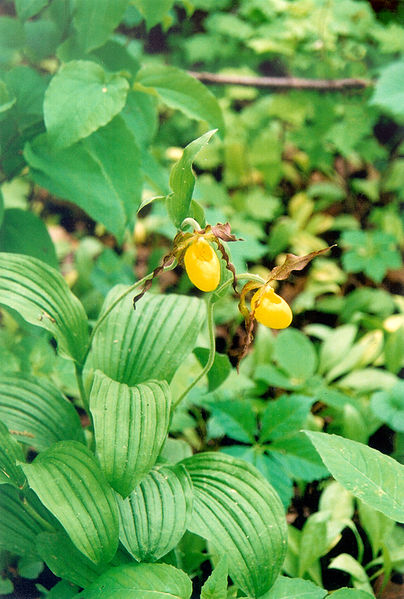Classification
The classification of the Yellow Ladyslipper in North America is currently being debated by taxonomists, however below listed is a classification from Domain to Species based on morphological characteristics such as flowers, roots, leaves and reproductive organs. It is most common to classify this flower by morphology because each species has its own variation (mainly in size) on the basic structure.
Domain: Eukarya
Kingdom: Plantae
Division: Anthrophyta
Class: Monocodyledones
Order: Orchidales
Family: Orchidacae
Genus: Cypripedium
Species: pubscens
parviflorum
makaskin
For the purpose of this website, I will be focusing on the species C. parviflorum. The differences between the different species are slight in the morphology of the flower (especially the characteristic slipper) and the distribution throughout North America. There are many variations on each species because these flowers easily make hybrids and therefore create a variation.
A Short Explanation of Classification:
Domain – Eukarya:
Organisms in the domain Eukarya are classified here due to their cellular structure. The organisms are composed of eukaryotic cells meaning they have a true nucleus, membrane bound organelles, multiple linear chromosomes, larger ribosomes and divide by mitosis.
Kingdom – Plantae
Here, all organisms are autotrophic (meaning they create their own food, usually via photosynthesis) and are primary producers in the trophic levels.
The main characteristics of Angiosperms are the production of flowers and fruits, seeds enclosed in a carpel, pollen tubes carry sperm to the egg and the seeds have endosperms.
Class – Monocodyledones
C. parviflorum is classified here due to its single seed leaf, pedals in a cluster of three and venation in the leaf is parallel (see picture at left) with scattered xylem and phloem.
Order – Orchidales
Plants in the order Orchidales are classified here for their unusual flowers, tube-like root structures, terrestrial habitats and perennial blooming.
Family – Orchidacae
Orchids classified here because their flowers are bilaterally symmetrical, there is almost always one pedal that is highly modified, the stamens and carpels have fused together and seeds are very small.
Genus – Cypripedium
The Cypripedium genus is formed of orchids that have their modified pedal to the shape of an egg, which many refer to as a lady’s slipper.
Species – Depends on which you look at!
Look here to find the differences between morphology of the three species classifications.
For those of you who like to see the big picture: I have created two cladistic phylogenetic trees for you. The first is broad and covers Genus to Order. The second is a bit more refined and covers order to species. These are not complete phylogenetic trees, because there are thousands of Families under Orchidaceae and I couldn't possibly include them all!
